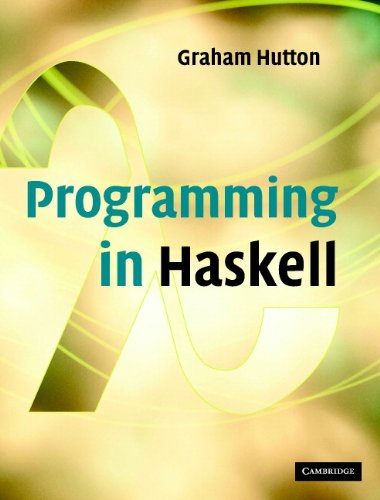Programming in Haskell pdf
Par perkins clair le mardi, juin 7 2016, 06:01 - Lien permanent
Programming in Haskell by Graham Hutton


Programming in Haskell Graham Hutton ebook
Page: 184
Format: pdf
Publisher:
ISBN: 0521871727, 9780511296154
I'm continuing to learn Haskell in my free time and as I like to learn by doing, I've been implementing common algorithms in the language. Haskell has the reputation of being one of the most advanced programming language of our time. Download Programming in Haskell. Haskell is a relatively new programming language that, though gaining in popularity, is not nearly as widespread as C or Java. Its main strengths are its functional paradigm, its purity which implies immutability, and a strong type system. I need the ability to manage a large amount of code and conciseness and modularity is paramount. It starts off with simple, introductory topics and explains concepts of functional approach to programming. This tutorial will teach you how to exploit parallelism through Haskell on your commodity multicore machine, to make your code faster. If you've never seen Haskell before, you're in for a real treat. Dynamic programming is a weirdly named way to speed up (complexity-wise) recursive algorithms. It's a language where functions can't have side-effects, where variables don't vary, and where infinitely long lists are a topic suitable for chapter 2. Continuing on my previous blog entry (Haskell for the Working Programmer), it occurs to me that there needs to be a set of idioms to define a Haskell for System Programming. The book assumes no prior knowledge of Haskell or functional programming. Stuck for a topic at Newcastle's Ruby group, I attempted an off the cuff talk on what Haskell is about, and what Ruby programmers could learn from it. We will introduce key parallel programming models, as implemented in Haskell, including:. Foltzer introduces Molog, a typed functional logic programming language written in Haskell. ISBN: 0521692695,9780521692694 | 184 pages | 5 Mb. If you've never enountered Haskell before, I find The Evolution of a Haskell Programmer an amusing and informative read. Peaker: Python's dynamic nature adds slowness and unsafety, but doesn't actually make things more expressive; sj4nz: Programming in weakly-typed languages forever after will feel like working with punch cards. I've been learning up on arrows as a good framework to create my robot control software for Maya.